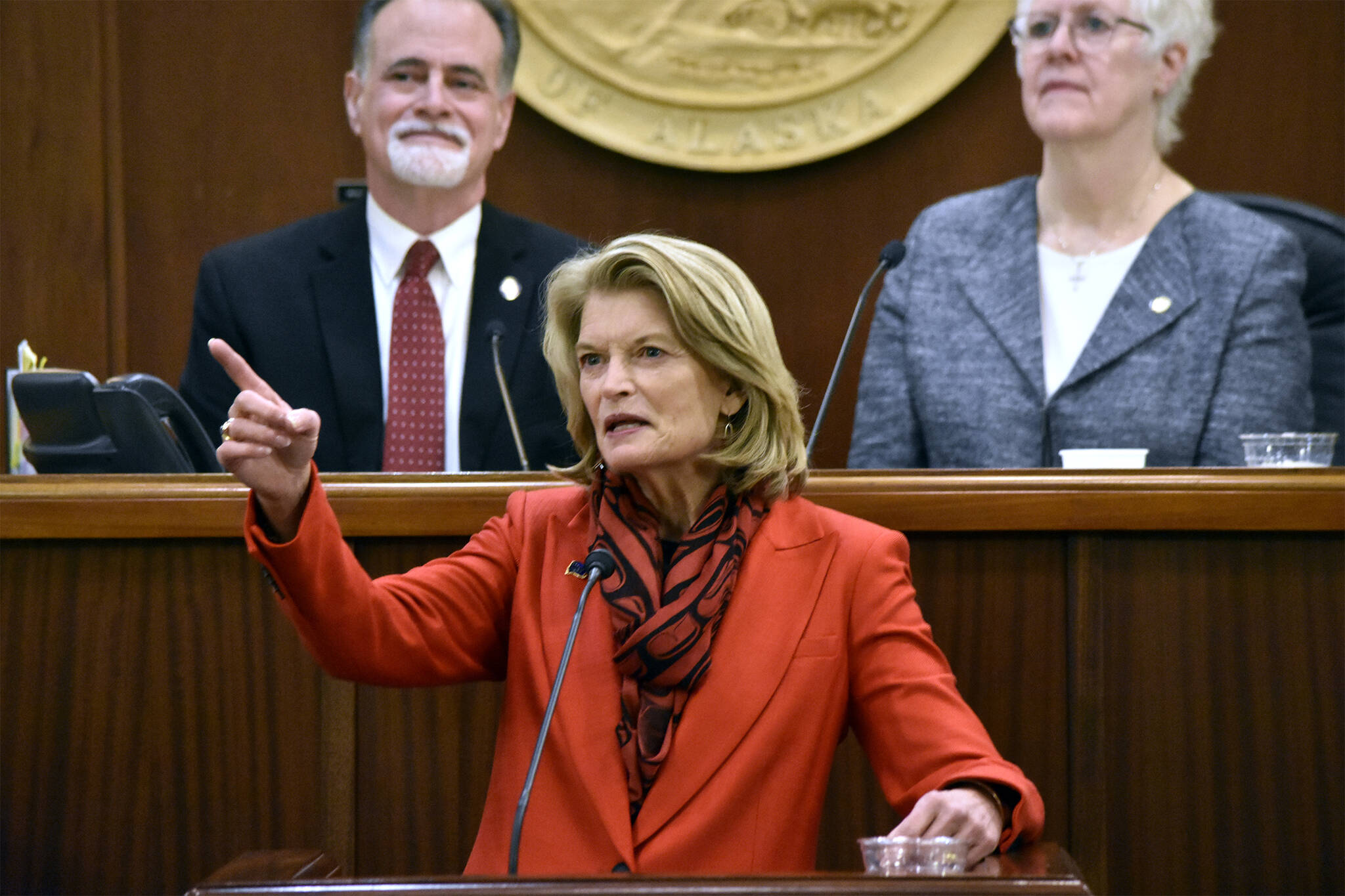Infrastructure and resource development were among the issues discussed by Republican U.S. Sen. Lisa Murkowski during an address to the Alaska Legislature during a joint session Tuesday in the state Capitol building.
She fielded questions from lawmakers after her roughly one-hour speech, in which she updated the body on what issues she’s been working on in Washington, D.C.
Murkowski is up for reelection this year and is being challenged by Kelly Tshibaka, a former commissioner of the Alaska Department of Administration who has also worked as the chief data officer for the U.S. Postal Service Office of the Inspector General and the acting inspector general of the Federal Trade Commission. Alaska State Sen. Elvi Gray-Jackson, D-Anchorage, announced last week she will also be vying for the seat.
Murkowski emphasized the impact the Infrastructure Investment and Jobs Act will have on Alaska. That legislation passed last year and includes $550 billion in new spending on infrastructure over five years. Murkowski was part of a 10-lawmaker cohort that worked to advance the legislation in the U.S. Senate, but took time Tuesday to praise the work of U.S. Rep. Don Young and his advocacy for the bill in the House.
“Over the next five years, I promise you, it will bring sustained benefits to both rural and urban communities across our state,” Murkowski said.
Included in the package is $42 billion in grants for U.S. states for the deployment of broadband and $273 billion in federal-aid highway formula funding that will provide about $3.5 billion in highway funding for Alaska over the next five years. That’s in addition to $225 million Alaska should receive to repair structurally deficient bridges.
According to documents shared by Murkowski’s office, the legislation includes $3.3 billion for natural resources, wildfire management and ecosystem restoration.
That is meant to be used to conduct mechanical thinning, controlled burns, fuel breaks and other activities on U.S. Department of the Interior and Forest Service Lands.
An additional $100 million is included for workforce training for firefighting and vegetation management that includes Alaska Native village fire crews.
Murkowski’s speech came as Russian President Vladimir Putin ordered troops to separatist regions of Ukraine. She called U.S. sanctions on Russia “absolutely necessary” and said a full-scale invasion would lead to a “catastrophic loss of life” and have implications for the security of Baltic States, for the North Atlantic Treaty Organization and for U.S. troops positioned around the world.
“We have witnessed the largest troop buildup in Europe since World War II and as we know, the invasion has begun,” Murkowski said. “What we had feared has begun. Russia is threatening, not just Ukraine, though, but the international order and the norms that have prevailed for decades.”
Murkowksi went on to advocate for the use of Alaska’s natural resources domestically. She criticized the White House’s efforts to block oil and gas production in the state.
“Frankly, no administration should look to (the Organization of the Petroleum Exporting Countries) instead of Alaska for supply,” Murkowski said. “No administration should entertain a bad nuclear deal with Iran to help lower prices instead of looking to our own opportunities, and no administration should defend a Russian pipeline instead of refilling ours.”
Murkowski concluded her Tuesday remarks with a series of anecdotes from her time on the central Kenai Peninsula. She recalled stopping for dinner at Odie’s Restaurant in Soldotna where she gathered with community members to talk about issues in town. Concerns she heard were about rising costs when it comes to culverts and the impact supply chain delays have on the ability of local businesses to operate.
“What I didn’t hear at Odie’s … was anybody that was willing to just give up, to say ‘This is just too hard,’” Murkowski said. “Every one of those small business owners said, ‘No, I’m committed to my business, I’m committed to what I’ve built, I’m committed to the people who are still here for me, I’m committed to my community and I’m committed to my state.’ It was just such a good reminder to us as Alaskans that we go through some challenging times, but we do it together.”
Murkowski’s full address can be found on her YouTube channel.
Reach reporter Ashlyn O’Hara at ashlyn.ohara@peninsulaclarion.com.

